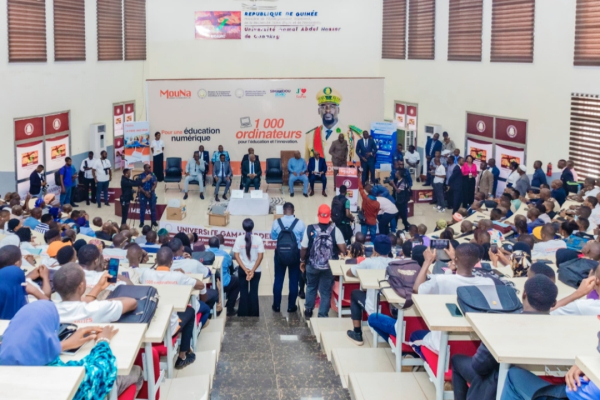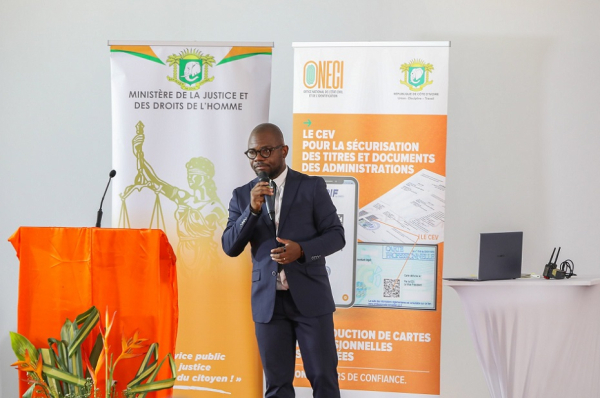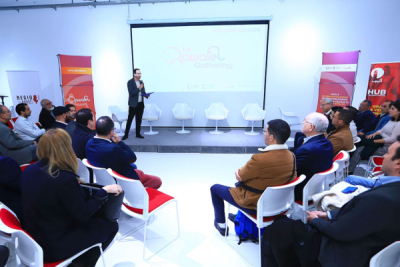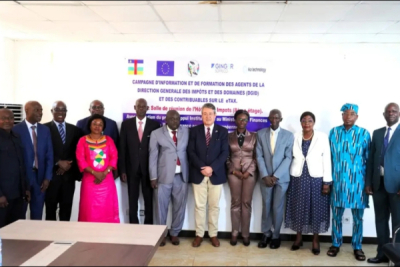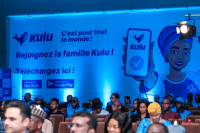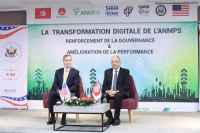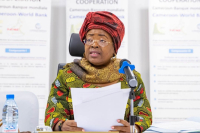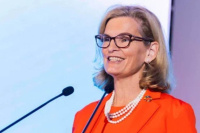
Tech (802)
To address challenges in accessing educational resources and modernize teaching methods, some countries are investing in digital technology. This tech integration aims to improve learning outcomes, build stronger skill sets, and foster innovation, which are all crucial for economic competitiveness.
On Monday, February 3, Guinea’s Prime Minister Amadou Oury Bah officially presented 1,000 laptops to students from the country’s public universities. This initiative, supported by MouNa Group Technologies in partnership with the Ministry of Higher Education, Scientific Research, and Innovation, aims to enhance student access to digital tools and promote technological progress in Guinea's education sector.
"The transformation we are initiating today must go hand in hand with a change in mindset. Our students must use these tools to gain knowledge, not just for entertainment. The future of our country depends on our ability to train talents that align with global technological advancements. That is why we will accelerate the development of the Higher Institute of Technology in Mamou, with the ambition of producing computers locally and achieving digital autonomy," the Prime Minister stated.
This initiative is part of the Simandou Academy, a key element of the Simandou 2040 project launched by President Mamadi Doumbouya. The program aims to position Guinea as a hub for research and innovation, addressing challenges related to sustainable development and technological sovereignty. According to Amadou Oury Bah, 2,200 primary schools across the country will soon incorporate digital tools into their teaching methods. Beginning with primary education, students will use tablets to access learning materials, ensuring they meet international educational standards.
By investing in digital education, Guinea is laying the groundwork for a more modern and inclusive education system while equipping its youth with the skills necessary to thrive in the digital economy. This commitment to innovation and digital competency represents a strategic asset for the country’s sustainable development and global competitiveness.
By Samira Njoya,
Editing by Sèna D. B. de Sodji
Digital solutions streamline public services, improve transparency, and give citizens easier access to a more modern and efficient government.
Côte d'Ivoire launched, last Thursday, its e-Justice platform, a key step in modernizing its public administration and improving access to judicial services. The platform allows citizens in Yopougon and Dabou to apply online for nationality certificates.
The e-Justice platform introduces several features designed to streamline the application process. Each applicant receives a unique identification number, and the platform uses a visible electronic seal for document authentication. Authentication is also handled through the VERIF application from the National Agency for Civil Registration and Identity (ONECI). Applicants can track the status of their applications in real-time, reducing administrative burdens and processing delays.
"Justice must be accessible, efficient, and transparent for all," said Jean Sansan Kambile, Minister of Justice and Human Rights. "Today, we are laying a crucial foundation for a more modern Côte d'Ivoire. This platform is a symbol of transformation and progress, serving every Ivorian."
The initiative is in line with Côte d'Ivoire's national digital transformation strategy, which aims to improve the efficiency of public services. According to the latest United Nations e-Government Report, Côte d'Ivoire ranks 124th out of 193 countries in online government development, with a score of 0.5587 out of 1. While the report acknowledges progress, including projects like e-Justice, it also highlights the need for further development to reach the level of the world’s most advanced digital administrations.
The launch of e-Justice marks the start of a digital transformation within Côte d'Ivoire’s judicial sector. The project will expand to other jurisdictions and incorporate new services, such as criminal record management, in the coming months. The ultimate goal is to harmonize and modernize the entire judicial system, providing citizens with a more accessible, secure, and efficient justice system.
By Samira Njoya,
Editing by Feriol Bewa
Collaboration between startups is a key driver of innovation and growth. By pooling resources, expertise, and networks, startups can more effectively overcome challenges related to funding, expansion, and market access.
The Digital Tunisia program has officially launched its first phase, focusing on the agritech sector. Led by consulting firm STECIA International in partnership with Qawafel, a program supporting Tunisian startups, the initiative aims to facilitate market access for Tunisian companies in agritech, healthtech, and edtech in Senegal and Mauritania.
In this initial phase, five innovative Tunisian companies will receive tailored support, including specialized training and strategic guidance to help them break into the Senegalese market. A business prospecting mission is scheduled for May 2025, providing participants with the opportunity to meet local partners and explore collaboration prospects.
The second phase will shift focus to healthtech and edtech. Six Tunisian startups in these sectors will be selected for market entry support in Mauritania. A prospecting mission and B2B meetings will take place in October 2025, helping companies explore export and cooperation opportunities.
Funded by the French Development Agency (AFD) and implemented by Expertise France, the program is part of a broader regional cooperation effort to strengthen trade and technological exchanges between North and West Africa. It aligns with Qawafel’s objectives of fostering economic development initiatives across the Maghreb and West Africa.
In the long run, the project aims to enhance cooperation among businesses in the three countries, position Tunisian startups as key players in the regional entrepreneurial ecosystem, and pave the way for future collaborations in other strategic sectors. By fostering interregional cooperation and technological innovation, the initiative seeks to develop solutions tailored to the needs of the African market.
Samira Njoya
African startups are increasingly vital to the continent's technological development, driving innovation, creating jobs, and attracting investment. Their growth requires a supportive environment to maximize their impact and strengthen their contribution to the digital economy.
Senegal's legal framework for startups is entering a new phase. On Wednesday, January 29, the government adopted the implementing decree for Law No. 2020-01 of January 6, 2020, governing startup creation and promotion. This long-awaited decree, years in the making, establishes a clear regulatory framework and introduces incentives for young, innovative companies.
The law aims to stimulate startup creation and growth in Senegal, focusing on creativity, innovation, new technologies, and national and international competitiveness. To qualify, companies must be based in Senegal, with at least one-third of their capital owned by Senegalese citizens, whether residing in the country or abroad. Existing businesses meeting the criteria can also benefit from startup status, which offers advantages such as streamlined administrative processes, preferential customs regimes, training and capacity-building programs, specific tax incentives, and access to financing.
This decree aligns with Senegal’s broader digital transformation strategy. In February, the country will launch the "New Technological Deal," an ambitious program designed to reshape the economy around four key pillars, including innovation and tech entrepreneurship. As part of this initiative, Senegal signed a memorandum of understanding with Google to provide artificial intelligence solutions and digital tools to accelerate the growth of local startups and SMEs.
The law's enactment is a major step forward for Senegal. By fostering a supportive environment for startups, it paves the way for increased entrepreneurial activity, greater competitiveness in global markets, and accelerated digital transformation. This structured legal framework is also expected to attract more investors and boost the tech sector, positioning Senegal as a leading innovation hub in West Africa.
By Samira Njoya,
Editing by Sèna D. B. de Sodji
To address the challenge of securing adequate resources, many African countries are embracing digital solutions. These technologies are streamlining tax collection, increasing transparency, and fostering development by making government agencies more efficient and accessible.
The Central African Republic (CAR) has launched e-Tax, a digital platform designed to simplify and improve the collection of taxes and duties. On Monday, January 27, it organized an information and training workshop, in Bangui, to introduce officials from the Directorate General of Taxes and State Property (DGID) to the platform.
Supported by the European Union, the initiative aims to enhance efficiency, increase transparency, and reduce the costs associated with tax administration. “Modernizing the tax administration through digitalization is a key lever for improving public revenue collection, ensuring transparency, and strengthening the fight against tax fraud,” said Jean Marc Dewerpe, head of cooperation for the European Union in CAR.
The adoption of e-Tax reflects the Central African government's commitment to modernizing public services and strengthening the country’s financial autonomy. So far, 301 large companies and 325 medium-sized enterprises have already been registered on the platform, and many taxpayers are beginning to benefit from its advantages. The system introduces features such as online tax filing and electronic payments.
The successful implementation of e-Tax is expected to significantly improve tax collection, reinforce citizens' tax compliance, and ensure greater transparency in public administration. With this initiative, the country also aims to bridge its gap in the E-Government Development Index (EGDI), where it currently ranks 182nd worldwide with a score of 0.0947 out of 1, according to the United Nations.
Samira Njoya
The Telecommunication Union's 2024 Global Cybersecurity Index highlighted Africa's significant cybersecurity gap compared to other regions. It also suggested that with the right policies and investment incentives, the continent can rapidly improve its cybersecurity posture.
The African cybersecurity market holds significant economic potential for both local companies and international investors, despite facing various challenges. According to Mordor Intelligence, the market, valued at $0.6 billion in 2024, is expected to grow to $1.28 billion by 2029, reflecting a compound annual growth rate of 13.5%.
The World Economic Forum's Global Cybersecurity Outlook 2025 report reveals that 36% of businesses are skeptical about their country's ability to manage a critical infrastructure cyberattack. Additionally, 27% remain neutral on the issue, while only 9% express confidence, highlighting the continent's vulnerability to escalating threats in an increasingly digital landscape. Ransomware attacks are particularly prevalent, targeting sectors such as finance, email, social media, and critical infrastructure, including energy and transportation, as noted in Interpol's 2023 African Cyberthreat Assessment Report. These attacks disrupt economies and undermine public trust, with African banks experiencing a notable increase in attacks on their digital payment systems.
Several factors contribute to this vulnerability. Many African countries have inadequate cybersecurity budgets and face a significant shortage of skilled professionals. While some nations have implemented data protection legislation, many still lag behind. Furthermore, businesses and citizens often underestimate the severity of cyber threats. According to Orange Cyberdefense's 2023 Security Navigator report, cyberattacks could result in a 10% loss in GDP across Africa, with extortion cases rising by 70% in 2023. This situation presents a real opportunity for developing solutions tailored to the continent's specific challenges. African universities and training centers can expand their curricula to meet the growing demand for qualified professionals, while local startups can innovate by creating products and services that address local needs.
Cybersecurity is essential for Africa's successful digital transformation. Addressing existing weaknesses is crucial for building trust and ensuring resilience in the digital age. African governments can support this transformation by implementing policies that foster innovation and investment in cybersecurity solutions tailored to the unique context of the continent.
Samira Njoya
The Guinean government prioritizes financial inclusion. To this end, several initiatives are underway to expand access to digital financial services.
Guinean fintech company Digital Wallet-Guinée (Diwalgi S.A.) launched a new electronic money solution, "Kulu-Guinée," on Friday, January 24. The launch, attended by Guinean government officials, marks a significant step forward in the country's efforts to digitize its economy.
"Nearly 60% of the adult Guinean population still lacks access to formal financial services. This situation exposes a large portion of our citizens, particularly merchants and informal workers, to significant risks. Kulu represents an innovative solution that not only promotes financial inclusion but also ensures transaction security while helping integrate our citizens into the formal economy," said Rose Pola Pricemou, Minister of Posts, Telecommunications, and the Digital Economy.
The Kulu-Guinée platform offers various services, including secure money transfers using a QR code, a phone number, or a unique Kulu identifier. It also provides payment options for everyday needs, such as shopping, transportation, hairdressing or dining services, and even salary payments.
This private initiative aligns with the government's ongoing efforts to accelerate the country's digital transformation, notably through the Simandou 2040 Strategic Plan, which positions digital technology as a key driver of economic modernization.
The platform is expected to strengthen digital financial inclusion, provide a safer and more convenient payment solution, and facilitate the integration of Guineans—particularly informal workers—into the formal economy.
By Samira Njoya,
Editing by Sèna D. B. de Sodji
Healthcare in Tunisia prioritizes efficiency and transparency. To meet the evolving needs of its population and enhance service delivery, the country has fully embraced digital transformation within the healthcare sector.
Tunisian Health Minister Mustapha Ferjani (photo, right) on Wednesday inaugurated a digital platform for managing medicines and health products, a significant step in the country's pharmaceutical sector digital transformation.
Developed by the National Agency for Medicines and Health Products (ANMPS), the platform aims to streamline administrative processes, particularly for issuing marketing authorizations (AMMs) and promotional licenses. It will also improve medicine traceability and provide citizens with online access to administrative services.
“This initiative will enable Tunisia to join the ranks of developed countries that rely on the pharmaceutical industry and the export of medicines,” stated Ferjani. He also highlighted that this innovation will help improve Tunisia’s ranking in global health standards by targeting the GBT3 level established by the World Health Organization (WHO).
The digital platform is designed to simplify and accelerate administrative processes, particularly for issuing marketing authorizations (AMMs) for medicines and promotional licenses. It will also enhance the traceability of medicines while making administrative services accessible online to citizens.
The project, carried out by a team of over 100 Tunisian experts with support from the United States, is part of a broader digitization program aimed at modernizing several strategic sectors in Tunisia. These efforts have already elevated Tunisia to the top spot in North Africa and third place on the continent for e-government, according to the UN’s “E-Government Survey 2024: Accelerating Digital Transformation for Sustainable Development.” With an online service development index of 0.6935 out of 1, Tunisia significantly surpasses the African average of 0.4247.
In addition to modernizing pharmaceutical administration, this initiative aims to enhance transparency, attract investment, and improve interconnectivity between government departments. With this advancement, Tunisia reaffirms its role as a regional leader in digital transformation, strengthens its healthcare sovereignty, and aligns with global best practices.
By Samira Njoya,
Editing by Sèna D. B. de Sodji
Artificial Intelligence (AI) is now a key driver of progress for nations. It provides innovative solutions to economic and social challenges, promoting the modernization of infrastructure, the optimization of public services, and competitiveness on the global stage.
Cameroon is developing a national strategy for artificial intelligence (AI), Minister of Posts and Telecommunications Minette Libom Li Likeng (photo) announced on Tuesday.
The strategy, currently under development, aims to position Cameroon as a key player in the global AI ecosystem, focusing on sectors such as health, agriculture, education, and governance.
"The strategy aims to position Cameroon as a key player in the global AI ecosystem, with a particular focus on strategic sectors such as health, agriculture, education, and governance. It is crucial to establish robust mechanisms to ensure responsible AI, strengthen digital infrastructure, develop local skills, and promote innovation," Li Likeng said at the opening ceremony of national consultations for the 2025 roadmap for the postal, telecommunications, and ICT sectors.
This initiative is part of the digital transformation acceleration project and is expected to contribute to the implementation of the National Development Strategy (SND30) and “Vision 2035.” These projects aim to transform Cameroon into “an emerging, democratic, and united country in its diversity” through structural economic transformation and inclusive development.
Once established, the national AI strategy will allow Cameroon to join other African countries, such as Benin, Nigeria, and Senegal, which have already adopted similar documents. Additionally, countries like Congo and Tunisia are also working on national AI strategies.
Cameroon’s strategy is designed not only to boost innovation and competitiveness through AI but also to address several major challenges. It will tackle ethical issues, ensure cybersecurity, and encourage effective data management. This will help maximize economic benefits and enhance the well-being of the population while mitigating the risks associated with emerging technologies.
Furthermore, the strategy is expected to improve Cameroon’s AI Investment Potential Index. This index, highlighted in the report “AI Investment Potential Index: Mapping Global Opportunities for Sustainable Development” published by the French Development Agency (AFD), measures a country's ability to attract AI investments based on criteria such as technological infrastructure, available skills, regulatory frameworks, and market potential.
Currently, Cameroon scores 30 out of 100 on this index, alongside countries like Angola, Guinea, Ethiopia, and Burkina Faso. This ranking underscores significant development opportunities while highlighting the efforts needed to enhance its attractiveness and fully leverage AI’s potential.
By Samira Njoya,
Editing by Sèna D. B. de Sodji
AI applications can address some of Africa’s most pressing challenges, such as food security, disease prevention, and climate resilience. With African startups increasingly leveraging AI for innovative solutions, such as mobile-based health diagnostics or precision agriculture, the coalition can fuel the growth of the continent’s tech ecosystem.
The International Telecommunication Union (ITU), a UN agency for digital technologies, has launched the AI Skills Coalition to close the global AI skills gap and expand access to AI education. Announced at the World Economic Forum in Davos, held from January 20-24, the initiative brings together over 25 founding organizations, including Amazon Web Services (AWS), Microsoft, the East Africa Community, and Cognizant.
ITU Secretary-General Doreen Bogdan-Martin commented: “Our new AI Skills Coalition is aiming to train thousands of people this year, especially those living in regions of the world just getting started on their AI journey, as part of our commitment to ensure that all communities can fully participate in our shared digital future."
The coalition will provide an online platform offering free resources on generative AI, machine learning, and sustainable AI applications. The platform, launching in March 2025, will offer self-paced courses, webinars, certifications, and specialized training on AI ethics and governance for developing countries. ITU will collaborate with the UNDP to deliver AI training in 170 countries.
This initiative holds particular significance for Africa, where a substantial digital skills gap limits many countries' ability to fully leverage AI's potential. As AI continues to transform industries, bridging this gap is essential for the continent to remain competitive on a global scale. According to a report by the International Finance Corporation (IFC), an estimated 230 million jobs in sub-Saharan Africa will demand digital skills by 2030, resulting in almost 650 million training opportunities.
This initiative aligns with the UN’s Pact for the Future and the Global Digital Compact, promoting inclusive AI adoption to drive sustainable development and bridge the global digital divide.
Hikmatu Bilali
More...
Senegal's digital transformation is driven by innovation and entrepreneurship. By supporting digital projects and offering targeted training programs, the country aims to promote inclusion, boost economic growth, and address social challenges.
In Senegal, the General Delegation for Rapid Entrepreneurship for Women and Young People (DER/FJ) plans to enhance its support for innovation and digitization in 2025 by investing 11.3 billion CFA francs ($18.08 million) in various projects. These funds will be allocated to several initiatives, including financing 15,000 micro-enterprises and facilitating the formalization of 10,000 businesses. The initiative was announced on Wednesday, January 15th, during a ceremony to present the results of the call for empowerment projects launched between September 24th and October 11th, 2024.
With an initial budget of 5 billion CFA francs, DER/FJ successfully financed 9,000 projects in 2024, amounting to a total investment of 5.6 billion CFA francs. Notably, many of these initiatives targeted the digital sector through programs like Lionstech (allocating €1 million to accelerate start-ups) and D4D (mobilizing €350,000 to support 100% digital projects). Start-ups such as Paps (logistics), Kalispot (fintech), and Sotilma (agritech) were among the primary beneficiaries of these programs.
These efforts align with the "New Technological Deal," a Senegalese government initiative aimed at establishing the country as a regional leader in innovation. This strategy emphasizes strategic investments in innovative start-ups and SMEs, which are critical drivers of digital transformation and economic growth.
For 2025, DER/FJ plans a series of initiatives to build upon the success of the previous campaign. In addition to startup financing, DER/FJ intends to significantly enhance the capacities of 10,000 beneficiaries through targeted training programs. These programs will equip them with the essential skills and knowledge they need to thrive in today's rapidly evolving entrepreneurial landscape.
By Samira Njoya,
Editing by Sèna D. B. de Sodji
Digital technology is revolutionizing education across the globe, unlocking new avenues for learning, inclusivity, and innovation. By seamlessly integrating technology into the educational landscape, stakeholders strive to bridge educational gaps, cultivate creativity, and empower young people to navigate the complexities of today's interconnected world.
Senegal's Ministry of National Education and Télé-École, an educational television channel, signed a partnership agreement on Thursday, January 16th, under the NuMEd Awards initiative. This collaboration aims to integrate technology and media into Senegal's education system, bridging the digital divide and fostering innovative teaching practices nationwide.
"Through the NuMEd Awards, the Ministry and Télé-École strive to create a virtuous cycle of education – one that is increasingly inclusive, engaging, and interconnected," the Ministry of National Education wrote in a press release. "This will equip every young Senegalese with the tools to succeed and navigate the challenges of the modern world."
The partnership will focus on expanding training programs, developing customized digital content, and ensuring equitable access to online tools for all students, including those in remote rural areas. The ultimate goal is to minimize regional disparities and create a strong foundation for shared academic success.
This initiative aligns with the Senegalese government's broader vision to accelerate the digital transformation of the education sector. This includes incorporating emerging technologies, such as artificial intelligence, into school curricula to prepare Senegal's youth for the digital economy of the future. This partnership also coincides with the unveiling of a national digital education strategy, backed by a five-year budget of $206 million.
Télé-École, a pioneer in educational broadcasting, plans to deepen its commitment by investing in digital platforms and introducing innovative teaching methodologies. This collaboration is expected to reach a wider audience and enhance communication among students, teachers, and parents, paving the way for a more connected and inclusive education system.
By Samira Njoya,
Editing by Sèna D. B. de Sodji
Digital transformation is a cornerstone of modernizing public infrastructure and fostering social and economic inclusion. Through ambitious initiatives, many countries are driving digitization, leading to increased transparency and sustainable growth.
Mauritania has reached a major milestone in its digital transformation journey with the official launch of the Digital-Y project on Thursday, January 16, in Nouakchott. Overseen by the Minister of Digital Transformation and Administrative Modernization, Ahmed Salem Ould Bedde (photo, center), the initiative aims to modernize public services, promote digital inclusion, and lay the foundation for transparent and efficient governance.
According to Ahmed Salem Ould Bedde, the project underscores the Mauritanian government's commitment to integrating digital tools into public administration to modernize services, strengthen administrative transparency, and drive economic and social development. He emphasized the importance of making these services accessible to all, particularly to reduce regional disparities and foster true digital inclusion.
The Digital-Y project is funded to the tune of €4 million and is being carried out in partnership with the German cooperation. It aligns with Mauritania's national digital transformation strategy, focusing on developing tailored solutions for public services, establishing unified standards, and enhancing the digital capacities of both institutions and citizens. Additionally, the program seeks to boost the national economy through e-commerce and foster strategic partnerships among the public sector, private sector, and technical and financial partners.
Despite ongoing challenges, this initiative represents a significant step forward for Mauritania as it strives to transform its public services into modern, efficient, and inclusive tools. The project is expected to improve Mauritania's e-Government Development Index (EGDI) ranking from the United Nations. In 2024, the country ranked 165th out of 193 countries with a score of 0.3491 out of 1, compared to 172nd in 2022. These advancements underscore the country's efforts to bridge its digital gap and align with international standards.
By Samira Njoya
Editing by Sèna D. B. de Sodji
On the cusp of a major digital transformation, Gabon is leveraging innovative technological solutions to modernize its public services. The goal is to position itself as a regional leader in e-governance, streamline access to administrative procedures, and enhance transparency.
Gabon is set to launch a digital public services platform in the first half of 2025. This initiative was announced, on January 15, in Libreville, during the second meeting of the Steering Committee in charge of the implementation of Gabon’s digital program Gabon Digital. The goal is to modernize the administration and provide all citizens with online access to administrative services.
"We will focus on digital payment systems, the national digital identity system, and implementing a public services platform," explained General Bonjean Rodrigue Mbanza, Minister of Digital Economy and New Information Technologies. "Our objective is to enable anyone, anywhere in the world, to connect with public services in real-time."
This platform is part of the program "Gabon Digital", which was launched last November with initial funding of 44 billion CFA francs (approximately $72.4 million) from the World Bank. This initiative reflects Gabon's ambition to solidify its leadership in e-governance in Africa. Although Gabon dropped from 11th to 15th place in the United Nations' E-Government Survey 2024, it remains a leader in Central Africa for digital initiatives.
The upcoming portal will allow Gabonese citizens to securely perform administrative tasks online, streamlining data processing and reducing the need for in-person visits. Key areas of focus include health (e-health), digital payments, and digital identity. The project aims to modernize public services while enhancing their efficiency and transparency.
By Samira Njoya
Editing by Sèna D. B. de Sodji


